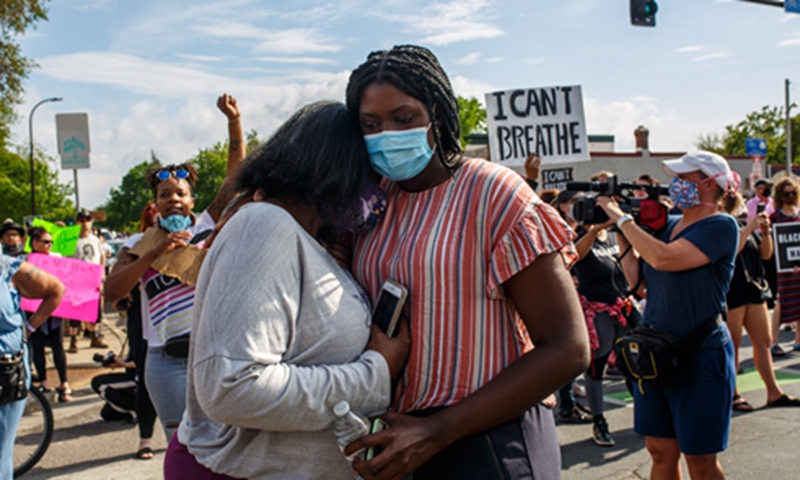Hard for US to recover PR damage in Africa after Floyd’s death
By Shen Shiwei Source:Global Times Published: 2020/6/3 17:53:38

People hold signs and protest during a rally after a Minneapolis Police Department officer allegedly killed George Floyd on Tuesday in Minneapolis, Minnesota. A video of a handcuffed black man dying while a Minneapolis officer knelt on his neck for more than five minutes sparked fresh furor in the US over police treatment of African Americans. Photo: AFP
The death of African American George Floyd has shocked African countries and the African Union (AU). But even as US diplomats and embassies across Africa quell fires to save public relations crises, Zimbabwe has refuted accusations by US National Security Advisor O'Brien that Harare is a "foreign adversary" who is stirring an anti-racism campaign over George Floyd's death.
Here is a question: How would Western media and US politicians portray massive riots and protests if George Floyd had died in some African country while in police custody? A similar question is asked in the Global Opinions section of the Washington Post: How would Western media cover Minneapolis if it happened in another country?
Maybe a clue to these questions could be found in the statement of US Ambassador to Zimbabwe Brian Nichols, who was summoned by Zimbabwe's foreign minister. He wrote, "I again urged Zimbabwe's government to end state-sponsored violence against peaceful protesters, civil society, labor leaders and member of the opposition in Zimbabwe." But at the same time, the Trump administration is mobilizing military and deploying National Guards to each state to quell protests. Stigmatizing US protestors as thugs, Trump tweeted that "when the looting starts, the shooting starts."
More importantly, US self-contradicting responses regarding violent protesters in the US and in Zimbabwe will definitely undermine its political morality to criticize African countries ever again.
Is this the right way to save US public relations with African countries? Maybe a fundamental policy shift is needed in Washington.
"America First" and "Africa Last" is the theme under this US administration. Under Trump's New Africa Strategy, former US national security advisor John Bolton emphasized that "every decision we make, every policy we pursue, and every dollar of aid we spend will further US priorities in the region."
In January 2018, the AU Commission expressed alarms at statements made by President Trump's dismissal of Haiti, El Salvador and African nations as "shit-hole countries." The 54 African countries' permanent representatives to the United Nations, and AU, requested an apology from President Donald Trump. Dozens of former US ambassadors to African countries expressed "worries" over those remarks. The African Bureau of the US State Department had to appease the anger like firefighters. And they have had to act fast this time too.
The African Growth and Opportunity Act (AGOA) has stimulated African countries' non-oil exports to the US and created lots of jobs for Africa. However, the Trump administration's cuts to international development, public health, and humanitarian aid to Africa will hinder economic and social transformation there. Especially during the COVID-19 pandemic.
Washington promotes a social media campaign to save public relations with African countries, while randomly accusing some countries' intervention with no hard evidence. Conflicting messages to African and US circles is not a good choice. Washington really needs to convey to African leaders and African people that Africa is genuinely a priority for the US, instead of an arena for an economic and geo-political competition with other powers — as many African leaders are vocally cautioning against.
But theory is one thing. Reality turns out to be another. The protests over Floyd's death will continue to shake American society and Africans' views on the US.
As this year mark the 60 Years of African Independence, a historic time of liberation, it's the right time for African countries, the AU, and African communities in countries like the US to strengthen unity for protection of the global African diaspora.
Actions speak louder than words. The US really needs to provide some concrete plans to African countries, instead of only tweeting words on social media.
The author is a non-resident fellow with the Institute of African Studies, Zhejiang Normal University, and research fellow with the Charhar Institute. opinion@globaltimes.com.cn
Posted in: VIEWPOINT